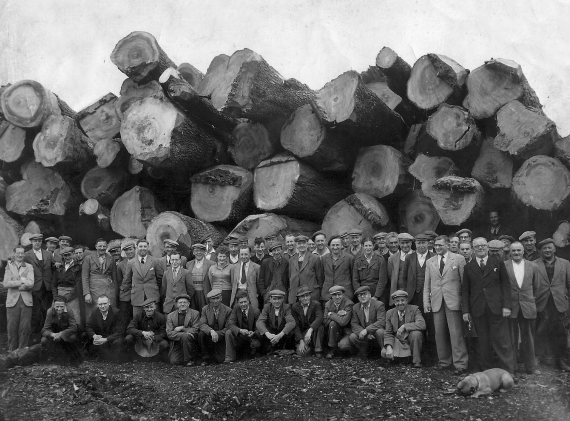The History Of Yandles
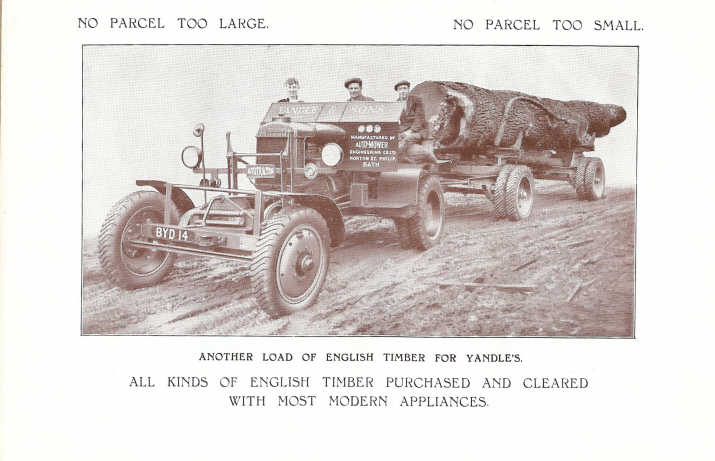
Founded in 1860!
Yandles was founded in 1860 by Henry Yandle, a wheelwright, after he resettled his family from Wiveliscombe to the then small, but prosperous Village of Martock.
It is thought that as the cloth mills around Wiveliscombe began to decline, Henry moved to Martock where there was a buoyant and successful industry based around agriculture.
It would seem that as a wheelwright he found plenty of work and soon began to expand his business with the help of his two sons, William and Fredrick. The Company carried out repairs to local properties, built the local gas works and several houses, as well as commencing the manufacture of gates, ladders etc. out of locally felled timber. By the start of the Great War the Company had developed a successful sawmilling business and during the War manufactured parts for gun carriages and ammunition boxes.
After the war the Company continued to expand its timber operations, sourcing timber locally, using Ash, Elm and Oak. Initially, running the Mill on steam with 14 heavy horses being used to haul the timber.
Gradually, Yandles began to move into the production of Elm Coffin sets (these consisted of a pair of ends and sides, a lid and bottom supplied in planed and sanded boards ready for the Coffin Manufacturer/Undertaker to assemble into a coffin) and after the Second World War this became their main production line.
All the timber could be found locally, with the Elm being in plentiful supply and fast-growing. Local Farmers would treat it like a crop selling a few trees off each year to provide extra income and as Elm had limited uses, due to the fact that it was prone to woodworm and had a tendency to warp there was little competition for the timber.
As demand grew the Company needed to look further afield for its raw materials as it required large trees in order to cut the coffin lids out of (jointing was not acceptable) and so gave up felling its own timber and relied on about thirty independent timber buyers from around the Country.
Yandles first steam engine which ran our mill.

One of the regular deliveries of huge Elm butts being unloaded.
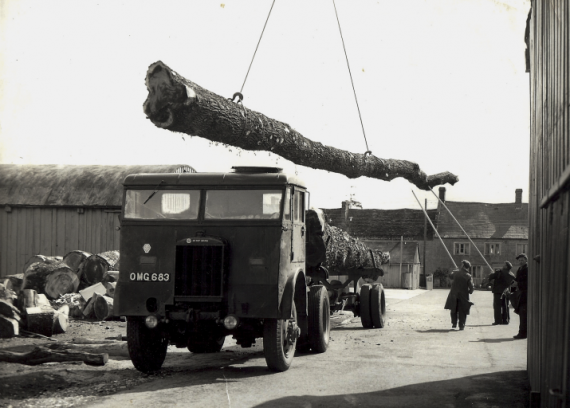
At its peak the Company had a workforce of around one hundred, producing 1000 coffin sets a week – representing about 10% of the United Kingdom market. For several decades, Yandles enjoyed considerable success – the raw material was relatively cheap and plentiful, the demand for its products was stable and it had good markets to get rid of all its waste timber.
The best of the tree was used for coffins, any reject boards were cut up and sent to South Wales to be manufactured into pallets and the outside slab wood was cut into pit props, even the sawdust was sold to local farmers for cattle bedding.
Yandles looked a completely different business to what it does today. The Mill would run ten hours a day and be a hive of activity, the current Woodworking Shop was where all the coffin sets were produced, the 303 Gallery contained a large bandsaw and the Hobbies Shop was the Carpenters workshop and later the Saw-doctors Shop (this was where all the saws were sharpened).
Outside would be massive stacks of logs - in the region of 100,000 cubic feet of timber which would be stacked under the crane and thousands of coffin boards would be drying upright in long rows out in the grounds.
Pit props being cut from tree tops during the 1960’s.
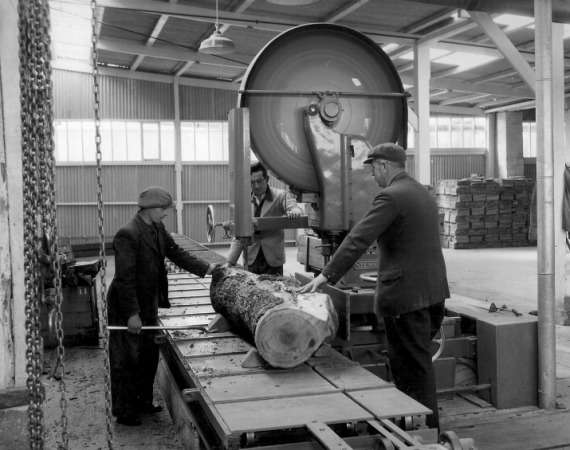
The Derrick Crane in operation
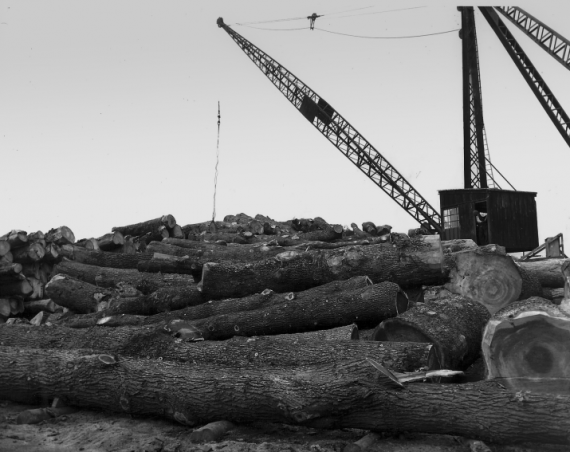
Several Lorries, full of timber, would arrive in each day and be unloaded piece by piece by the large Derek Crane.
Between the Second World War and the 1970’s the Company enjoyed steady growth, stable market conditions and was able to reinvest in new plant and machinery, which included putting in a new sawmill in the late 1970’s. Unfortunately, disaster then came in the form of the Dutch Elm Disease which over a period of a few years wiped out the majority of Elms growing in mainland Britain and in doing so Yandles lost its only source of raw materials.
The disease was spread by a beetle that attacked the bark of the tree causing it to die, but not affecting the actual timber. The problem was that the sheer volume of trees dying made it impossible to fell and plank them before the actual timber began to decay - the heartwood of Elm would normally begin to go yellow and rot within a three to four year period from the tree dying. Today, there are still some areas in Britain where the Elm still survives – one such area being Brighton, which is naturally protected by the Sea and the Downs, backed up by the Local Authority carrying out rigorous checks on all their trees.
Two lorry loads of coffin sets would be sent out each week, plus one load of pallet boards and one of pit props. The work would be seasonal as the death rate spiked during the winter months and so there was always problems trying to dry the coffin boards, whilst in the summer months the staff would spend their time painting and carrying out repairs and improvements to the buildings.
With the advancement of medicine and generally better living conditions today, the death rate is pretty constant throughout the year with just the occasional increase, often caused by exceptional weather conditions or a flu outbreak.
Coffin board being cut on a straight line edger (which is still in use today)
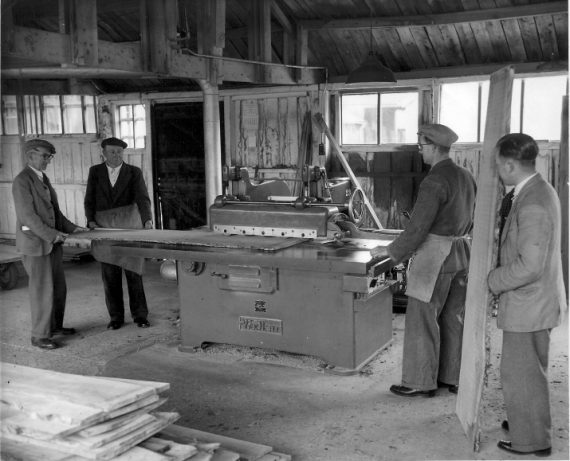
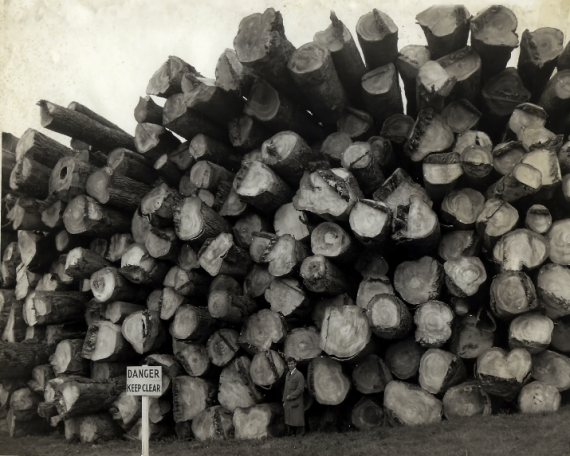
.png)
Spot Gerald Mounstephen (our present Chairman) at the base of the stack.
Within a few years, stocks of Elm were exhausted and the Company found itself with a Workforce and Mill but no raw materials. The Coffin Manufacturers began to look elsewhere for new materials such as chipboard and whilst Yandles looked for new timbers such as Oak and Utile, the cost of these was considerably higher so instead of producing thousands of sets, sales dropped to just a few hundred each month. The Company obviously had many contacts within the Undertaking Trade and so looked for other products to manufacture which involved less timber. Soon it was producing thousands of cremation caskets (small boxes to put cremated remains into), wooden coffin handles and breastplates for coffins out of both English and American Oak and today is one of the UK’s leading manufactures of these items.
The Sawmill began to mill Oak for construction work including timber-framed houses, jetties and barn conversions as well as a variety of dried timber for general use. Today, it supplies timber to projects throughout the United Kingdom, offering a fast turnaround on orders and good quality. The Mill sources timber from around the world and also enjoys the benefits of running its own Sawmill which allows the Company to react quickly to more bespoke or urgent orders. All the timber the Company purchases has to meet current legislation in order to ensure that it is not dealing in illegally felled timber which gives Yandles customers peace of mind.
During the 1980’s, after years of discouraging members of the public to visit, the Company began to sell timber to Woodworkers and DIY enthusiasts. More and more Woodturners came in looking for wood and asking us to cut out bowl blanks, so eventually, a room was set aside, where a limited range (compared to what we have today) of blanks was on offer. Soon Woodturners began asking us to stock polishes and Craft Supplies products and within a short space of time we had opened our Shop selling everything from tools and timber to machinery.
The popularity grew rapidly and soon we outgrew the space and moved the Shop to its current home where we were able to display a greater selection of timbers, tools and machinery making it into one of the UK’s largest dedicated Woodworking Centres. Initially, the Somerset Guild of Craftsmen moved into the old Woodworking Shop alongside the Cedar Tree Café, but with more visitors coming to Yandles it was felt that other attractions for non - woodworkers were needed and so the Hobbies Shop was born.
As the interest for hobbies grew it took over the entire Old Woodworking Centre and with the Somerset Guild moving elsewhere, Yandles launched the 303 Gallery – an Arts and Crafts Showroom. Today Visitors can enjoy the Gallery, Hobbies Shop, Woodworking Centre and Café seven days a week and with easy access and free parking, Yandles has become a unique shopping destination for thousands of visitors.
Over twenty years ago the Company held its first Woodworking Show attracting around 500 people and this has grown into two major shows held twice a year, drawing in crowds of over 6000 to each event. Throughout the year the Company holds a variety of special events, promotions and courses and these are published on our Website. In recent years, the Company has expanded its entire business and in 2013 invested in a new website which is the one you are looking at today.
During the past 160 years, Yandles has had to change and adapt in the face of nature, consumer tastes and fashions, reinventing itself to meet the current demands. Every year we look at new ideas to improve our Customers experience and strive towards surviving the next 100 years or so.
Hopefully, if you are in the area, you may take the time to visit us so that you can appreciate the full ‘Yandles Experience’.
